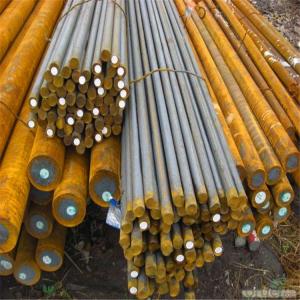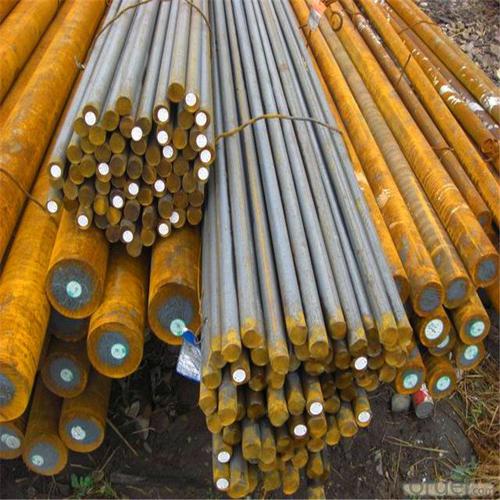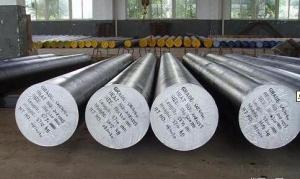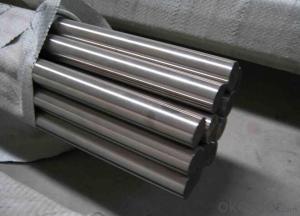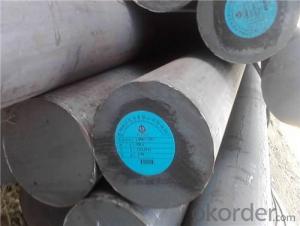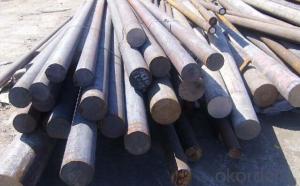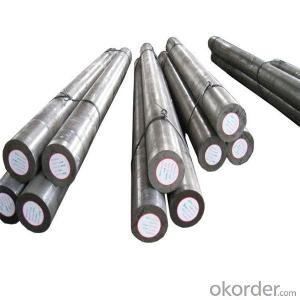34CrNiMo6/1.6582/4340 Steel Round Bar
- Loading Port:
- Tianjin
- Payment Terms:
- TT OR LC
- Min Order Qty:
- 100 m.t.
- Supply Capability:
- 500000 m.t./month
OKorder Service Pledge
OKorder Financial Service
You Might Also Like
Specification
34CrNiMo6/1.6582/4340 Steel Round Bar
Product Description of 34CrNiMo6/1.6582/4340 Steel Round Bar
1. Steel grade: ASTM4140, SCM440, 42CrMo, DIN1.7225
2. Length: 6M-12M
3. Diameter: 16mm-300mm
4. Product range: round bar, flat bar, square bar
5. Technique: Hot rolled, forged, cold drawn
Specification of 34CrNiMo6/1.6582/4340 Steel Round Bar
Material | SCM4140 | Round bar | Dia(mm) | 16-300mm |
Process | EAF + LF + VD + Forged + Heat Treatment (optional) | Length (mm) | Max 12m | |
Heat treatment | Normalized / Annealed / Quenched / tempered | Flat bar | Thickness(mm) | 8-500mm |
Delivery condition | Hot forged +Rough machined (black surface after Q/T)+ Turned (optional) | Width(mm) | 70-200mm | |
Test | Ultrasonic test according to SEP 1921-84 D/d | Length (mm) | Max 12m |
Chemical Composition of 34CrNiMo6/1.6582/4340 Steel Round Bar
C | Si | Mn | Cr | Mo | P | S |
0.38~0.43 | 0.15~0.35 | 0.75~1.00 | 0.8~1.1 | 0.15~0.25 | ≤0.035 | <0.04< td=""> |
Photo Show of 34CrNiMo6/1.6582/4340 Steel Round Bar
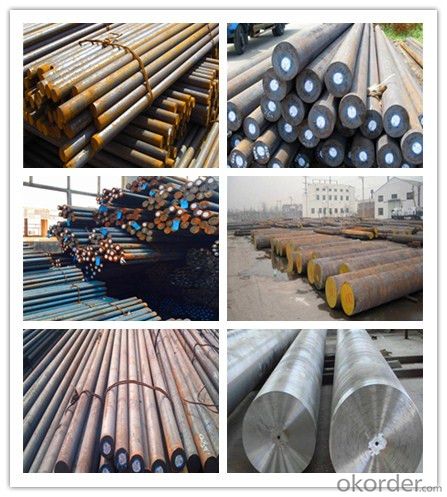
Packing and Delivery:
Packing in bundle package, or as customer's requirements.
Delivery Detail: 45 days after receiving the deposit.
Usage and Applications of 34CrNiMo6/1.6582/4340 Steel Round Bar
1. Steel round bar is used in a large number of architectural and engineering structures. Or it can be used in construction of plants for the production of steel house frames, high-voltage transmission towers, bridges, vehicles, boilers, containers, ships, etc.
2. And we can use this kind of product on the performance of the mechanical parts if the demand is not very high.
3. Some special material steel round bar can be used for main shaft of steamer, hummer shank, with big section and supper force.
Company Information
CNBM International Corporation is the most important trading platform of CNBM group.
Whith its advantages, CNBM International are mainly concentrate on Cement, Glass, Iron and Steel, Ceramics industries and devotes herself for supplying high qulity series of refractories as well as technical consultancies and logistics solutions.


F A Q
1, Your advantages?
professional products inquiry, products knowledge train (for agents), smooth goods delivery, excellent customer solution proposale
2, Test & Certificate?
SGS test is available, customer inspection before shipping is welcome, third party inspection is no problem
3, Factory or Trading Company?
CNBM is a trading company but we have so many protocol factories and CNBM works as a trading department of these factories. Also CNBM is the holding company of many factories.
4, Payment Terms?
30% TT as deposit and 70% before delivery.
Irrevocable L/C at sight.
5, Trading Terms?
EXW, FOB, CIF, FFR, CNF
6, After-sale Service?
CNBM provides the services and support you need for every step of our cooperation. We're the business partner you can trust.
For any problem, please kindly contact us at any your convenient time.
We'll reply you in our first priority within 24 hours.
- Q: What are the different grades of alloy steel round bars for automotive applications?
- Automotive applications commonly utilize alloy steel round bars due to their exceptional strength, durability, and resistance to wear and corrosion. The grading of these bars is typically based on their chemical composition, mechanical properties, and appropriateness for specific automotive uses. Here are several distinct grades of alloy steel round bars frequently employed in automotive applications: 1. 4140/42CrMo4: Renowned for its high tensile strength, good toughness, and excellent fatigue strength, this grade of alloy steel round bars is extensively employed in gears, crankshafts, axles, and suspension components. 2. 8620: Offering exceptional hardenability, this grade of alloy steel round bars can be subjected to heat treatment to attain high strength and toughness. It is commonly utilized in shafts, gears, and camshafts. 3. 4340: Known for its impressive strength and toughness, this grade of alloy steel round bars provides good wear resistance and can be heat treated to achieve even greater hardness and strength. It is often used in connecting rods, crankshafts, and high-stress components. 4. 52100: This high carbon, chromium alloy steel is renowned for its outstanding hardness and wear resistance. It is commonly employed in applications such as bearings and races that require high strength and durability. 5. 316L: Recognized for its exceptional corrosion resistance, particularly in harsh environments, this grade of alloy steel round bars is frequently utilized in automotive applications like exhaust systems, where resistance to corrosion is crucial. 6. 4340M: Specifically designed for high-performance automotive applications, this modified version of the 4340 grade offers improved fatigue strength and toughness. It is suitable for demanding applications, including high-performance engine components. These examples represent only a few of the various grades of alloy steel round bars employed in automotive applications. The selection of a specific grade depends on the requirements of the application, including desired strength, toughness, wear resistance, and corrosion resistance.
- Q: Can steel round bars be used for making fuel system components?
- No, steel round bars are not suitable for making fuel system components as they lack the necessary corrosion resistance and compatibility with fuels.
- Q: Can steel round bars be used in the production of power tools?
- Yes, steel round bars can be used in the production of power tools. Steel is a durable and strong material that is commonly used in the manufacturing of various tools and machinery, including power tools. Steel round bars can be used to create the body, handles, and other components of power tools, providing stability, strength, and longevity. The steel used in power tools is often selected for its high tensile strength and resistance to wear and tear. Additionally, steel can be easily machined, allowing for precise shaping and customization of power tool components. Overall, steel round bars are a suitable choice for the production of power tools due to their strength, durability, and versatility.
- Q: What are the common sizes of steel round bars?
- The common sizes of steel round bars vary, but some frequently used diameters range from 1/4 inch to 12 inches.
- Q: What is the difference between a cold finished and a hot rolled steel round bar?
- The manufacturing processes and resulting properties of a cold finished steel round bar and a hot rolled steel round bar are different. To manufacture cold finished steel round bars, a cold drawing process is used. This involves pulling the steel through a die at room temperature. As a result, the steel has a smooth, polished surface with tight dimensional tolerances. Additionally, the cold drawing process improves the strength, hardness, and overall mechanical properties of the steel. Cold finished steel round bars are commonly used in applications where precision and a smooth surface are important, such as in machinery, automotive parts, and tools. In contrast, hot rolled steel round bars are manufactured by heating the steel to a high temperature and then rolling it through a series of rollers. This allows for shaping and forming while the steel is pliable. Hot rolled steel round bars have a rough, scaled surface and looser dimensional tolerances compared to cold finished bars. They also tend to have slightly lower strength and hardness. Due to their lower cost and ease of production, hot rolled steel round bars are frequently used in construction, structural components, and general fabrication. In summary, the differences between cold finished and hot rolled steel round bars are found in their manufacturing processes and resulting properties. Cold finished bars offer improved strength, precision, and a smooth surface, making them suitable for applications requiring high precision and mechanical performance. On the other hand, hot rolled bars have a rougher surface and looser tolerances, but their affordability and ease of production make them a popular choice for general applications.
- Q: How are steel round bars used in the construction of stadiums and sports facilities?
- Steel round bars are commonly used in the construction of stadiums and sports facilities for their strength, durability, and versatility. These bars are often used as structural elements, providing support and stability to the overall structure. They can be used in the construction of columns, beams, and frames, ensuring the integrity and safety of the facility. Additionally, steel round bars are also used in the fabrication of seating structures, railings, and fencing, enhancing the aesthetic appeal and functionality of the sports venue.
- Q: Can steel round bars be used for making control arms?
- Yes, steel round bars can be used for making control arms. They are commonly used in the automotive industry as they provide strength, durability, and stability required for control arm applications.
- Q: Can steel round bars be used in food processing industries?
- No, steel round bars are generally not suitable for use in food processing industries as they can corrode and contaminate the food. Stainless steel, on the other hand, is commonly used in such industries due to its corrosion resistance and hygienic properties.
- Q: Three - grade thread Phi 10 steel can replace a grade Phi 12 round bar? Which elder knows, trouble pointing.
- Notes on reinforcement replacement1, steel replacement, to understand the design intent, the important components of the steel replacement, with the consent of the design unit (the actual: to change the design units should be agreed).2, steel replacement, should meet the minimum reinforcement ratio requirements and reinforcement structure (such as minimum steel reinforcement diameter, spacing, root number, anchorage length, etc.) provisions. The bar as possible with the original design of root number.3, crack resistance requirements of the components (such as crane beam, truss bottom chord, etc.) with smooth steel (not reinforced grade) instead of rebar.4, do not change the effective height of the component.
- Q: What are the limitations of using steel round bars?
- Using steel round bars in various applications has several limitations. One such limitation is their vulnerability to corrosion. Steel round bars, particularly those made of carbon steel, are prone to rusting when exposed to moisture or harsh environments. This can have a significant impact on their structural integrity and lifespan. Another limitation is their weight. Steel is a heavy material, and round bars can be especially cumbersome to handle and transport, especially in large quantities. This can make the installation process more difficult and increase the overall project cost. In addition, steel round bars may not be suitable for applications that require high levels of flexibility or bending. Their rigid nature makes it challenging to shape or mold them into intricate designs. This limitation can restrict their use in certain industries or architectural designs that demand more versatile materials. Another factor to consider is the cost of steel round bars. Depending on the grade, quality, and market conditions, the price of steel round bars can fluctuate significantly. This can be a financial limitation for projects with tight budgets or when the cost of raw materials is a crucial factor. Lastly, steel round bars may not be suitable for applications that require high resistance to extreme temperatures. While steel has good thermal conductivity, certain temperature ranges can affect its structural properties, potentially causing weaknesses or deformations. Overall, steel round bars have widespread use and offer many advantages. However, it is essential to consider their limitations such as susceptibility to corrosion, weight, limited flexibility, cost, and temperature sensitivity when selecting materials for specific applications.
Send your message to us
34CrNiMo6/1.6582/4340 Steel Round Bar
- Loading Port:
- Tianjin
- Payment Terms:
- TT OR LC
- Min Order Qty:
- 100 m.t.
- Supply Capability:
- 500000 m.t./month
OKorder Service Pledge
OKorder Financial Service
Similar products
Hot products
Hot Searches
Related keywords
